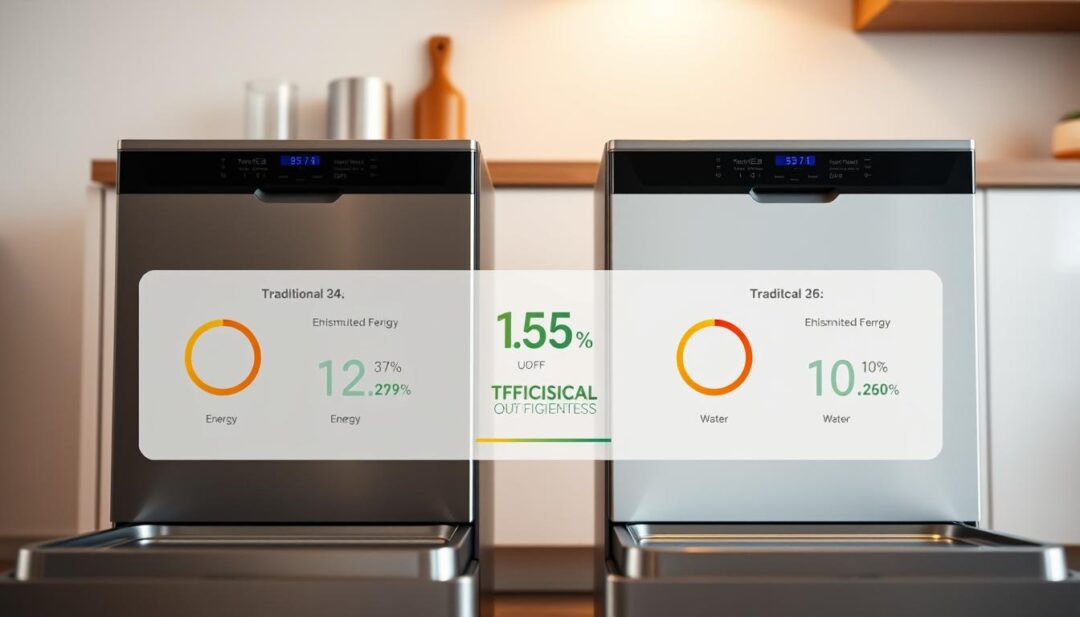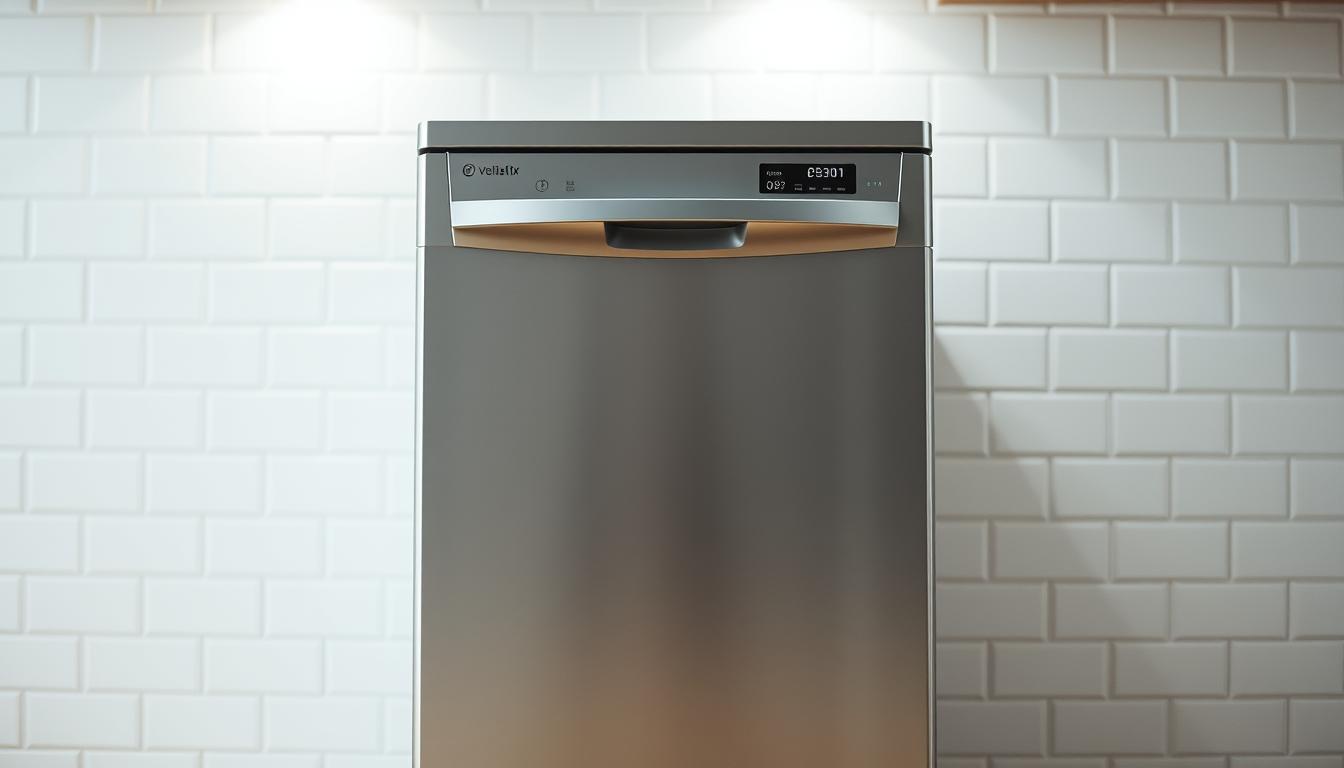Smart vs. Traditional Dishwashers: Which is Better?
Are you tired of manually washing dishes after every meal, or are you considering upgrading to a more modern kitchen appliance? With about 30% of dishwashers on the market now having WiFi connectivity, the decision between choosing a smart or traditional dishwasher has become increasingly relevant.
The rise of smart appliances has transformed kitchen dynamics, offering enhanced convenience and efficiency. But, are these modern dishwashers truly superior to their traditional counterparts? Let’s explore the benefits and drawbacks of each type to help you make an informed decision.
Key Takeaways
- Smart dishwashers offer advanced features like WiFi connectivity and scheduling.
- Traditional dishwashers are often more budget-friendly upfront.
- Energy efficiency varies between smart and traditional models.
- Smart dishwashers can be controlled remotely via smartphone apps.
- Traditional dishwashers may have simpler, more straightforward operation.
The Evolution of Modern Dishwashers
The modern dishwasher has undergone significant transformations since its inception, evolving into a sophisticated kitchen appliance. This evolution has been driven by advancements in technology, changing consumer needs, and the desire for more efficient and effective cleaning.
From Basic Cleaning to Advanced Technology
Initially, dishwashers were designed to perform a simple task: clean dishes. However, over time, they have become more complex, incorporating features like multiple wash cycles, energy efficiency, and advanced sensors. These advancements have significantly improved their performance and convenience.
The Emergence of Smart Home Kitchen Appliances
The rise of smart home technology has led to the development of smart dishwashers, which can be controlled and monitored remotely through smartphone apps. These appliances often include features like Wi-Fi connectivity, energy monitoring, and smart sensors that optimize the wash cycle based on the load’s soil level.
The integration of smart technology into dishwashers represents a significant shift in kitchen appliance design, offering users greater convenience, flexibility, and efficiency.
What Defines a Smart Dishwasher?
A smart dishwasher is more than just a kitchen appliance; it’s a hub of convenience and efficiency in the modern home. With its advanced technology and connectivity features, it offers users a range of benefits that traditional dishwashers cannot match.
Wi-Fi Connectivity and App Control
One of the defining features of a smart dishwasher is its WiFi connectivity, allowing users to control and monitor their appliance remotely through a dedicated app. This feature enables users to start or pause cycles, receive notifications when a cycle is complete, and even monitor energy consumption.
Advanced Sensors and Automation
Smart dishwashers are equipped with advanced sensors that detect the level of soil on dishes and adjust the washing cycle accordingly. This automation not only ensures cleaner dishes but also optimizes energy and water usage.
Popular Smart Dishwasher Brands and Models
Some of the leading brands in the smart dishwasher market include Bosch, Samsung, and LG. These brands offer a range of models with varying features, from basic smart functionality to advanced automation and customization options.
Traditional Dishwashers: Tried and True Technology
Traditional dishwashers have stood the test of time, providing a dependable and straightforward solution for cleaning dishes. These appliances have been refined over the years to offer reliable and efficient cleaning performance.
Standard Features and Functionality
Traditional dishwashers typically come with a range of standard features, including multiple wash cycles, adjustable racks, and detergent dispensers. These features allow users to customize their washing experience based on the type of dishes being washed. The adjustable racks provide flexibility for accommodating larger or oddly shaped items, while the various wash cycles ensure that dishes are cleaned effectively.
Mechanical vs. Electronic Controls
One of the key differences among traditional dishwashers is the type of controls they use. Mechanical controls offer a simple, tactile interface that some users prefer for its ease of use. On the other hand, electronic controls provide a more modern look and can offer additional features such as delay start and child lock. The choice between mechanical and electronic controls often comes down to personal preference and the overall aesthetic of the kitchen.
Leading Traditional Dishwasher Manufacturers
Several manufacturers are known for producing high-quality traditional dishwashers. Brands like Bosch, Whirlpool, and KitchenAid offer a range of models with varying features and price points. These manufacturers have built a reputation for reliability and performance, making them trusted choices among consumers.
Smart Dishwasher vs. Traditional Dishwasher: Key Differences
The primary differences between smart and traditional dishwashers lie in their technology, control methods, and cycle options. Understanding these differences is essential for making an informed decision when choosing a dishwasher that fits your needs.
Technology Comparison Chart
| Feature | Smart Dishwasher | Traditional Dishwasher |
|---|---|---|
| Wi-Fi Connectivity | Yes | No |
| App Control | Yes | No |
| Advanced Sensors | Yes | No |
A comparison of the technology used in smart and traditional dishwashers reveals significant differences. Smart dishwashers are equipped with Wi-Fi connectivity and can be controlled through mobile apps, offering greater flexibility and convenience.
Control Methods and Interfaces
Smart dishwashers feature intuitive interfaces and can be controlled remotely through smartphones. In contrast, traditional dishwashers have mechanical or electronic controls that require manual operation.
- Smart Dishwashers: Touch screens, mobile app control, and voice assistant compatibility
- Traditional Dishwashers: Mechanical knobs, electronic buttons
Cycle Options and Customization Capabilities
Smart dishwashers often come with customizable cycle options and advanced sensors that detect soil levels and adjust water temperature and cycle duration accordingly. Traditional dishwashers typically have pre-set cycles with limited customization.
In conclusion, the choice between a smart dishwasher and a traditional dishwasher depends on your specific needs and preferences. By considering the differences in technology, control methods, and cycle options, you can make an informed decision that suits your lifestyle.
Upfront and Long-term Cost Analysis
A comprehensive cost analysis of dishwashers must consider both initial expenses and long-term savings. When evaluating smart and traditional dishwashers, several key factors come into play.
Purchase Price Ranges by Category
Smart dishwashers typically come with a higher upfront cost, ranging from $800 to $1,500, while traditional models can be found between $400 and $1,000. The premium for smart dishwashers is largely due to their advanced features and technologies.
Energy and Water Cost Savings Over Time
Despite the higher initial cost, smart dishwashers can offer significant energy and water savings over time. Studies indicate that smart dishwashers can be up to 30% more energy-efficient and use 20% less water than traditional models. This translates into lower utility bills and a reduced environmental footprint.
Maintenance and Repair Expense Differences
Maintenance costs for smart dishwashers may be slightly higher due to their complex technology, but they often come with longer warranties and more reliable performance. Traditional dishwashers, while less expensive upfront, may incur higher repair costs over their lifespan.
In conclusion, while smart dishwashers are more expensive initially, their long-term savings and benefits can make them a more cost-effective choice in the long run.
- Key Considerations:
- Initial purchase price
- Energy and water efficiency
- Maintenance and repair costs
Energy and Water Efficiency Comparison
Smart dishwashers are designed with energy and water efficiency in mind, but how do they compare to traditional models? As consumers become more eco-conscious, the energy and water efficiency of dishwashers has become a key consideration.
Water Consumption Metrics
Smart dishwashers often feature advanced sensors that detect the size of the load and the level of soil, adjusting water consumption accordingly. This can lead to significant water savings, especially for smaller or less soiled loads. In contrast, traditional dishwashers typically use a fixed amount of water per cycle, regardless of the load size or soil level.

Energy Star Ratings and Electricity Usage
Many smart dishwashers are Energy Star certified, indicating they meet energy efficiency standards set by the U.S. Environmental Protection Agency. These dishwashers often use less electricity than traditional models, especially when running eco-friendly cycles. The use of advanced technologies like load-sensing and delay start can further reduce energy consumption.
Eco-Friendly Features and Programs
Smart dishwashers frequently include eco-friendly wash cycles and features like half-load options, which can significantly reduce both water and energy usage. Some models also offer smart notifications when a cycle is complete or when maintenance is required, helping to prevent unnecessary energy consumption.
By comparing these aspects, consumers can make informed decisions about which type of dishwasher best suits their needs and contributes to a more sustainable household.
Cleaning Performance and Effectiveness
Understanding the cleaning performance of dishwashers is crucial for households looking to optimize their kitchen routines. The effectiveness of a dishwasher is not just about getting dishes clean; it’s about how efficiently it does so while conserving resources.
Soil Sensors and Adaptive Washing
Smart dishwashers often come equipped with soil sensors that detect the level of food residue on dishes. This feature allows for adaptive washing, where the dishwasher adjusts its cycle based on the soil level, ensuring a thorough clean while minimizing water and energy consumption. As noted by experts, “Smart dishwashers can optimize water usage and cleaning performance by adapting to the load’s conditions.”
Spray Arm Technology and Water Distribution
The design of the spray arm and its water distribution system plays a significant role in a dishwasher’s cleaning performance. Advanced spray arm technologies in smart dishwashers ensure that water is distributed evenly and effectively across all dishes, removing food residue efficiently. This results in cleaner dishes and reduced need for re-washing.
Drying Methods and Effectiveness
Drying performance is another critical aspect of a dishwasher’s effectiveness. Smart dishwashers often feature advanced drying methods, such as condensation drying or heat drying, which ensure dishes come out dry and spotless. According to a leading appliance review, “The drying capability of smart dishwashers is significantly improved compared to traditional models, thanks to their sophisticated drying technologies.”
In conclusion, the cleaning performance and effectiveness of smart dishwashers surpass those of traditional models, thanks to their advanced technologies like soil sensors, improved spray arm designs, and enhanced drying methods. These features not only ensure cleaner dishes but also contribute to a more efficient and sustainable kitchen routine.
Smart Home Integration and Convenience Features
Modern smart dishwashers offer a range of innovative features that simplify kitchen tasks. One of the key advantages of these appliances is their ability to integrate seamlessly with existing smart home systems.
Voice Assistant Compatibility
Many smart dishwashers are compatible with popular voice assistants like Alexa and Google Home. This allows users to control their dishwasher with simple voice commands, making it easier to start or stop cycles, check the status, or receive notifications when a cycle is complete.
Mobile Notifications and Remote Monitoring
Smart dishwashers often come with dedicated apps that provide mobile notifications and remote monitoring capabilities. Users can check the status of their dishwasher, receive alerts when a cycle is finished, and even start or stop the dishwasher remotely using their smartphone. For more information on the latest smart dishwasher models, you can visit top smart dishwashers for 2025.
Integration with Other Smart Kitchen Appliances
The integration of smart dishwashers with other kitchen appliances creates a cohesive smart kitchen ecosystem. This interoperability enables users to manage multiple appliances through a single interface, enhancing convenience and streamlining kitchen operations. For instance, a smart dishwasher can be programmed to run during off-peak hours when integrated with a smart home energy management system.
Common Problems and Troubleshooting
Understanding common problems with smart and traditional dishwashers can help homeowners troubleshoot effectively. Both types of dishwashers have their unique issues, but some problems are common to both.
Traditional Dishwasher Issues and Solutions
Traditional dishwashers may require more maintenance due to their mechanical components. Common issues include clogged filters, faulty drain pumps, and worn-out seals. Regularly checking and cleaning filters can prevent clogs and improve performance. For more complex issues like a faulty drain pump, it may be necessary to consult a professional.

Smart Dishwasher Connectivity Problems
Smart dishwashers offer advanced features through Wi-Fi connectivity, but this can also lead to connectivity issues. If your smart dishwasher is not connecting to your network or app, try restarting the device and checking your Wi-Fi signal strength. For persistent issues, refer to the user manual or contact the manufacturer’s support.
When to Call a Professional
If you’ve tried troubleshooting and your dishwasher still isn’t working correctly, it may be time to call a professional. Complex issues like internal mechanical failures or software glitches require expert diagnosis and repair. You can find more detailed repair guides on websites like Whirlpool’s dishwasher repair blog.
Lifespan and Durability Considerations
When investing in a dishwasher, understanding its lifespan and durability is crucial for making an informed decision. Both smart and traditional dishwashers have their own set of characteristics that affect how long they last and how well they perform over time.
Average Lifespan Comparison
The average lifespan of a dishwasher can range from 7 to 12 years, depending on the type, usage, and maintenance. Smart dishwashers, with their advanced technology, may have a similar lifespan to traditional ones if properly maintained. However, their reliance on software and connectivity could potentially impact their longevity.
Software Updates and Technological Obsolescence
One of the key differences between smart and traditional dishwashers is the need for software updates in smart models. While these updates can improve performance and fix issues, they also raise concerns about technological obsolescence. As technology advances, a smart dishwasher may become outdated if it cannot receive updates to support new features or compatibility with other smart devices.
Warranty Coverage Differences
Warranty coverage is another aspect where smart and traditional dishwashers differ. Smart dishwashers often come with more comprehensive warranties that cover both parts and labor for longer periods, reflecting their complex technology. In contrast, traditional dishwashers typically have standard warranties that cover fewer components and shorter durations.
Understanding these differences is essential for homeowners to make informed decisions that meet their needs and budget.
Best Fit for Different Households
The type of dishwasher that suits a household best is determined by several key factors, including technological inclination and budget. Understanding these factors is crucial in making an informed decision between smart and traditional dishwashers.
Tech-Savvy vs. Traditional Homeowners
For tech-savvy homeowners, smart dishwashers offer advanced features such as Wi-Fi connectivity, mobile app control, and voice assistant compatibility. These features provide convenience and flexibility, allowing users to monitor and control their dishwasher remotely. On the other hand, traditional homeowners might prefer traditional dishwashers, which offer simplicity and reliability without the need for complex technology.
Family Size and Dishwashing Frequency
Family size and dishwashing frequency are also important considerations. Larger families may benefit from smart dishwashers with advanced sensors that can detect the level of soil and adjust the wash cycle accordingly. A comparison of dishwasher capacity is shown in the table below:
| Dishwasher Type | Capacity (Place Settings) | Energy Consumption (kWh) |
|---|---|---|
| Smart Dishwasher | 14 | 0.8 |
| Traditional Dishwasher | 12 | 1.2 |
Budget Constraints and Priority Considerations
Budget constraints play a significant role in the decision-making process. Smart dishwashers are generally more expensive than traditional ones, but they offer long-term energy and water savings. Households with budget constraints may need to weigh the initial cost against the potential savings over time.
Key Considerations: When choosing a dishwasher, consider your household’s specific needs, including tech-savviness, family size, and budget. By evaluating these factors, you can make an informed decision that meets your needs and priorities.
Conclusion: Making the Right Dishwasher Choice
Choosing between a smart dishwasher and a traditional dishwasher depends on individual needs and priorities. By considering factors such as energy efficiency, cleaning performance, and smart home integration, consumers can make an informed dishwasher choice that suits their lifestyle.
Smart dishwashers offer advanced features like Wi-Fi connectivity and app control, making them ideal for tech-savvy homeowners. On the other hand, traditional dishwashers provide reliable performance at a lower upfront cost, appealing to those on a budget.
Ultimately, the decision comes down to weighing the benefits of each type against personal preferences and household requirements. Whether opting for the innovative features of a smart dishwasher or the straightforward functionality of a traditional dishwasher, the right choice will enhance kitchen convenience and efficiency.



